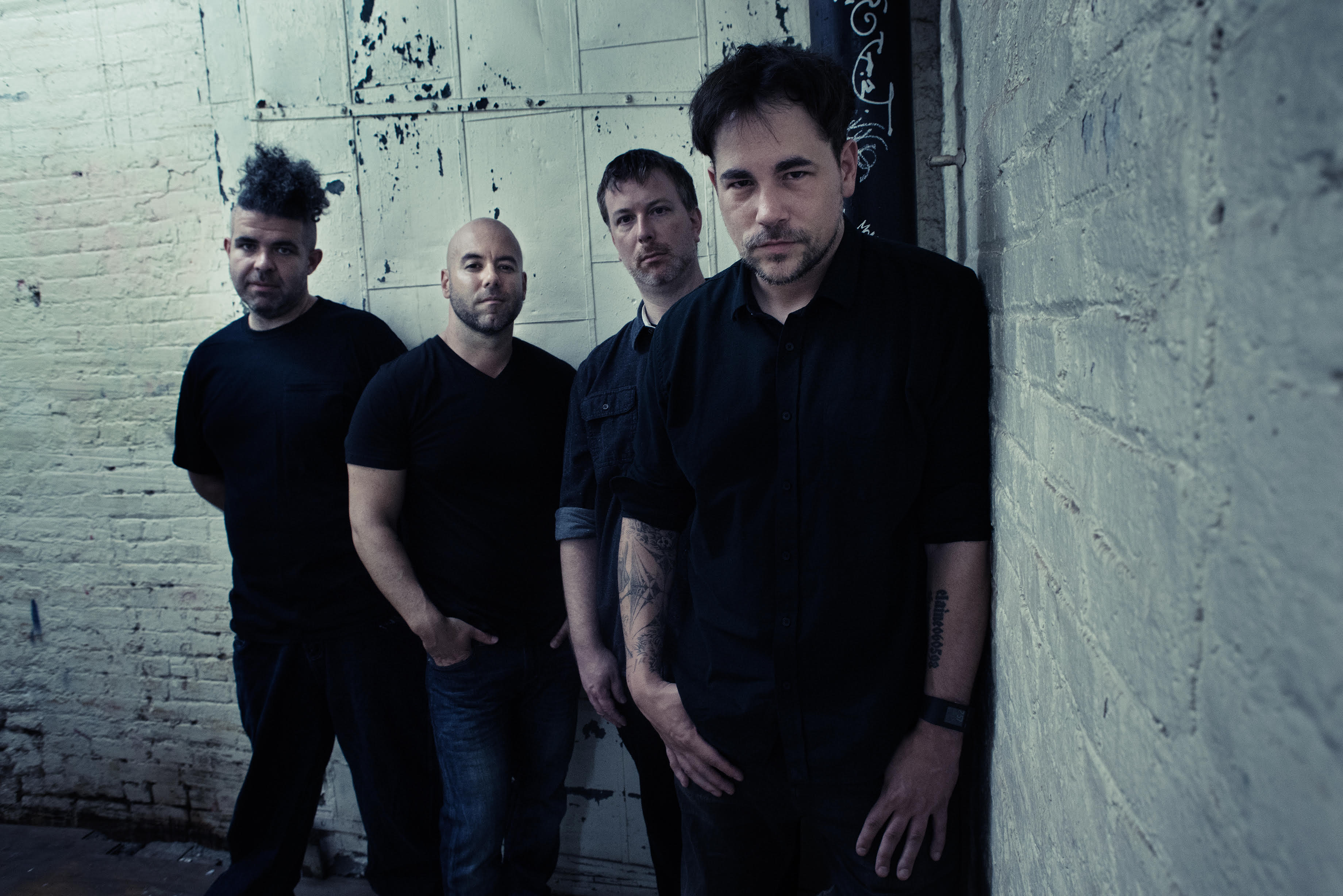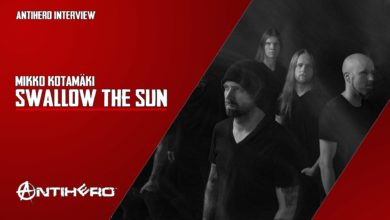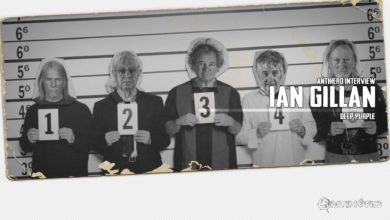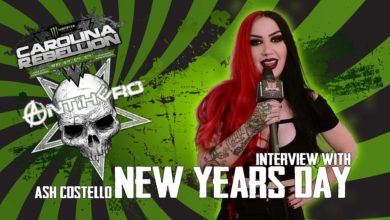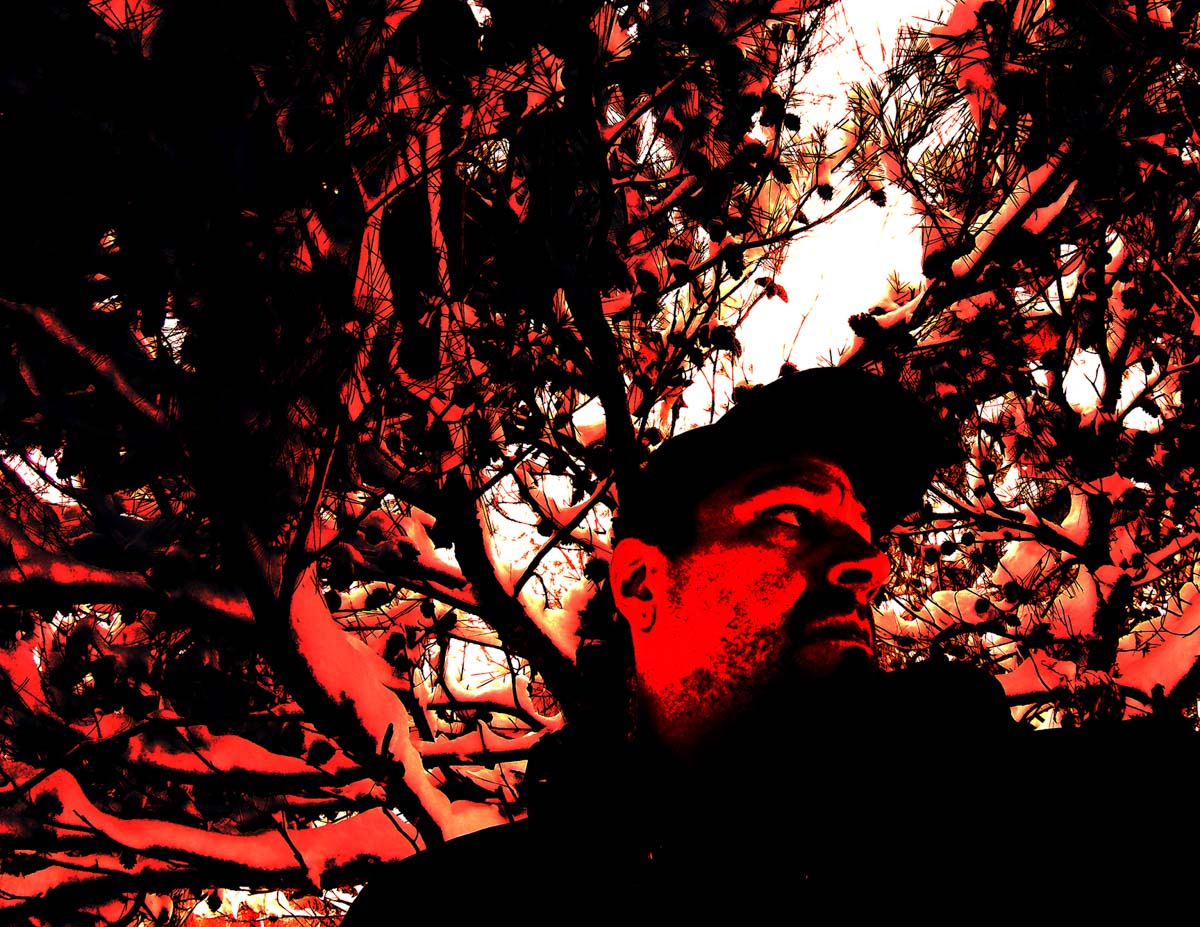Long Island, New York mathcore act, Car Bomb made their rounds in the UK while supporting Gojira recently, and Antihero Magazine’s Mark Dean had the opportunity to chat with vocalist Michael Dafferner and bassist Jon Modell when the band stopped in Manchester.
Mark Dean: Afternoon, I’m sitting in the Manchester Academy with Car Bomb. How’s the tour been going so far?
Jon: Amazing.
Michael: Fuckin’ amazing.
Mark Dean: Better every show?
Jon: Yeah.
Mark Dean: Are people aware of who you are? I mean, it’s a lot of pressure going on as an opening band.
Michael: People actually show up. And I think that says something about metal in general. I think with a lot of other genres, people come to see the headlining bands.
Jon: It’s not like we’re playing at 9 o’clock. We’re first and we’ll play at seven-thirty.
Michael: And yet people are there. So, we’ve been like, “What the fuck?”
Mark Dean: It also has an advantage in that you get on early, do your stuff, and then enjoy it afterwards.
Michael: Absolutely.
Mark Dean: Have you been over here in the UK before?
Michael: Yeah, the last time we were here we were on tour with Meshuggah. I guess that was … What?
Jon: December of 2014.
Michael: December of 2014. Yeah, that was the first time we ever toured here.
Jon: It’s the only date we’ve ever played in the UK.
Michael: Oh, yeah, we played the Roundhouse with Meshuggah. That was the only date on that tour.
Mark Dean: Do you find generally that audiences are different, country to country, or are they just all the same?
Michael: Oh, no a hundred percent different.
Jon: Even in the states. State to state you can find different kind of …
Michael: Oh absolutely, yeah.
Jon: In New York, there’s so many bands that come through which seems like the crowds are just like …
Michael: Yeah.
Mark Dean: They’re indifferent?
Jon: Yep, they’re indifferent. They’re entitled somehow. I don’t know what it is man. And then you go somewhere like the middle of the country maybe where a lot of bands don’t play and they’re very grateful they were there and just have a fucking great time. I played in Japan before and in Japan they’re very polite. They just stand there and watch and you think they’re not enjoying it, but it’s just the culture. They’re just very polite. I think in Scandinavia, we started the tour there. It’s similar attitude, but they’re very polite.
Michael: Yeah. Because metal is such a big thing there. I think they are really just there to like … If they don’t know you … It’s not like they’re being dense. It’s just like they showed up. They’re standing there. They’re watching us.
It’s fucking enough for us. They’re actually trying to absorb what you’re doing. Probably slamming the gavel down as far as how they feel about you but Scandinavia is definitely different than the UK. The UK it’s been a lot more energy even if they don’t know the song.
Jon: No. We played in London like two nights ago and people had a pit and there was another little crew of people that knew all the lyrics and they were fucking freaking out, singing all the fucking lyrics with Mike, I mean it was …
Mark Dean: It must be nice getting that feedback especially as an opening band. You can feed off that.
Michael: Yeah. I mean, I thought it couldn’t get better than London. And then when we had the off day and we had the show in Darby. On a Monday night, we had two hundred people show up and some people drove for eight hours just to get to that fucking show.
Jon: Amazing!
Michael: Yeah, I mean I was blown away. I was like, “What the fuck?” I was just blown away. I mean that last night was so amazing.
Jon: Unexpected.
Mark Dean: Coming from Northern Ireland I’ve got to ask the obvious question. Regarding the origins of the band name?
Michael: Oh yeah, right
Jon: It’s way more stupid than you think. Greg and I shared a house together for a while at the beginning of the band and we were looking for a name. There’s an album by this band called the Negative Land. They have a song called “Car Bomb.” The guy just spouts out. It’s just a drum beat, “Pounding Pounding”, and he’s going like, “Break pads, drive shaft.” And then he stops and he’s like, “Car Bomb!” And just … So, we were just listening to that, laughing, and we were like, “That’s it!”
Mark Dean: So, it’s never got you any negative publicity?
Jon: No. I mean, I’m not saying that.
Michael: No. You know what? When we first started, I think we weren’t even signed … The relapse at this point. We just had a demo out there that we were handing out. We had these stickers where we would take any car manufacturer, so say the Cadillac, we would put the same font but just put “Car Bomb.” Or Chevy, we put “Car Bomb” on a Chevy logo. So, these are stickers people are putting on their car. We also had these incense, they hang from your mirror. We’re handing out demos and CDs at shows. We got a cease and desist letter from GM. We were like, “Fuck it man, we’re going to make it. We’re going to be somebody.”
Jon: It’s also a little weird when we travel internationally and we go to the airport. And they’re like, “So what are you here for?” And I’m like, “We’re a band.” And they’re like, “Oh, what’s the name of your band?” And I’m like, “Yeah, it’s Car Bomb.”
Michael: “Please let us on the plane!”
Jon: We’re not going to blow anything up.
Mark Dean: Only sonically?
Jon: Yeah.
Mark Dean: The band have been around for what, ten years? What have been the major changes for the band in that time? Just sum it up briefly. I know a hell of a lot has gone on in 10 years.
Jon: We were way more chaotic back then. We’re more structured now. Our songs are more theme based or idea based instead of … We had a lot of “let’s play this part and let’s play that part.” I think our song is kind of where it needs to be. Also, it takes a lot of time to develop that. And our live show has gotten way better. It’s not just four guys standing on a stage trying to headbang or whatever. We’ve incorporated – this is the second time now – we’ve done a DIY light show. We try to just make everything as chaotic for the fan as possible.
Michael: The other major change, especially from this record, for Meta, is that Joe [Duplantier – Gojira] produced our record. It was a huge change because we never had anybody produce anything. Everybody, except for me, is a super perfectionist. Especially Elliott and Greg, who are very good at production. Greg still co-produced the record, but having somebody like that outside the band helping us – it was relaxing and fucking fun. They did all the guitars and bass themselves, the drums and vocals in the studio with Joe. I think that was a major change for us and it was such a great experience, and taking the mixing and the mastering out of our hands. We gave that to Josh Wilbur. That was a huge.
Jon: We’ve been very protective of the band. Its sound. Our songs. Everything. And never letting anybody else really come in and help us with it. Sort of like hands-off a little bit. We’re all control freaks.
Mark Dean: What about the album artwork? Was that something in which you guys still have direct input in?
Jon: Yeah, Greg [Kubacki] does all the art for the band.
Michael: Yeah, Greg’s the mastermind behind the band as far as he writes a lot of the music. I write the vocals, he writes a lot of the music, and John and Elliot will write along with them. They’ll write riffs and incorporate things. Yeah, Greg’s pretty much the mastermind behind Car Bomb. He does the artwork. He does a lot of the pre-production stuff.
Jon: Visionary.
Mark Dean: Do you have a record label at the moment? They don’t actually seem to do much these days.
Jon: It’s a fucked-up situation. You don’t have the reach that the label has. You don’t have the distribution capabilities that the label has. If somebody in the UK, Europe, Australia or anywhere outside of the US that wants to buy something from us, the shipping costs are exorbitant. And we really want to try to do something to fix that, and our reach in general. We all work full-time. It’s hard to do the music and then to promote it.
Mark Dean: And social media side of things as well?
Jon: In some sense a label would be great for us to kind of alleviate hands-off a little bit. And at the same time, I’ve had this conversation – We don’t need the money. So, a label typically will advance a band the money and a record and the label works hard for the band because the label wants to make the money back. And the band wants to work hard for the label because now they have all the money they need to pay back. But if we’re not getting the money from the label then where’s the incentive for the label to work hard for us. We’re certainly entertaining the idea of talking to people and discussing interesting opportunities – maybe not very standard, nothing like a 360 deal or anything like that. But something that would fit the mold of what we’re trying to do.
Mark Dean: What are your opinions on fan-funded things which seem to be increasingly popular in today’s music industry?
Michael: Nah.
Jon: Yeah…
Mark Dean: People are totally in for it or totally against it. So, people generally do not sit on the fence.
Michael: Yeah, that doesn’t feel right, like I would rather just pay for a shipment.
Mark Dean: From a fan’s point of view, they favour those things because you feel that you’re actively helping the band, and contributed to that album or that tour.
Jon: We’d rather them come see us. Buy a shirt when you’re here or buy a CD online or a digital download or something. Support us that way. We’ll get the products out there and then just come and help us at that point. And to be honest, it’s not about profit. It’s all a loss but it’s a worthy loss.
 Mark Dean: Your music is pretty powerful and dramatic in the studio. How do you like to kick back and relax? Are there any kind of guilty musical pleasures you have?
Mark Dean: Your music is pretty powerful and dramatic in the studio. How do you like to kick back and relax? Are there any kind of guilty musical pleasures you have?
Michael: Everybody in the band has their thing. Elliott and Jon like Frank Zappa and Jazz Fusion. Which I don’t listen to so much. There’s music that I listen to that nobody in the band likes, and then I start singing and they just look at me like I’m a fucking…. I love the Smith’s. I love Morrissey. I love Depeche Mode. I love the Chariot and Sixty-Eight. Chariot because it’s metal. It’s more punk and hardcore. I can’t think of a specific band. And I know there is one. There’s one that I just can’t think of. But there are certain bands that everybody’s like, “What the fuck is wrong with you? Why are you sending this to me? This sucks so bad.” And I’m like, “What is wrong with you?”
Guilty pleasures, I don’t find any guilt in the music I listen to. When I was in the fifth grade, I got into Iron Maiden. I don’t think if I heard Iron Maiden now I would necessarily love it, but I love them because it was part of my life. Things like that. Obviously, they’re huge and everyone loves them. Guilty pleasures is a weird word. I just like so much.
We all listen to different stuff. We’re all into electronic music, Radiohead obviously. You name it.
Jon: I like Zeppelin, but Elliott won’t listen to any of that stuff.
Michael: That’s true. Sleepytime Gorilla Museum.
Jon: We’re huge Sleepytime fans.
Michael: Yeah, Jon got us all into that. That was one of those bands that I was like, “Holy fucking shit!” Guilty pleasures as far as what the band doesn’t like that I love – and my girlfriend won’t let me listen to it in the car – is Subtle, this band Subtle. They’re not together anymore but they’re a rap group. They sing. They did some stuff. Nobody I show it to likes it. I’m the only person I know that likes them. That’s probably number one guilty pleasures. I just can’t turn anybody on to them. Even though they’re not a band anymore. Their last album was in 2010, I think. It’s just funny. I’m like, “How do you not like this?”
Mark Dean: What lies ahead for the band after the completion of these UK dates?
Jon: So, we’re kind of talking to people about maybe some festivals over here. Later this year maybe. Writing, we’re going to try to really slim down the album cycle. Basically, about four years’ worth. So, we can even cut it in half, or even make it in three years instead of four, something we’re looking to do. Maybe start recording by the beginning of next year. And then just play as much as we can. Again, we all have day jobs. We’ve been very fortunate that bands like us. So, when these opportunities come up we make it work.
Mark Dean: Who would you guys like interviewing if you were asking the questions, maybe not a musician even, a personal hero and inspiration?
Michael: I had the rare opportunity when I created a documentary called “Why you do this?” And I got to interview Randy Blythe of Lamb of God. Interviewing Joe [Duplantier – Gojira], interviewing Josh from The Chariot, interviewing these bands that are to me iconic. I had that opportunity but obviously, I would like to interview childhood idols like James Hetfield and Mike Patton.
Mark Dean: How did you find that experience of interviewing rather than being asked the questions?
Michael: I found it… I’m just very shy and have low self-esteem … I’m quiet, sit in the corner by default. So, when Randy from fucking Lamb of God comes in and is like, “So what do you want me to do? Where do you want me to sit?” He was like, “You have to tell me what to do.” I’m like, “Okay man, sit there and I got to put the light on you.” And I had to change who I was. So, I found it intimidating and exhilarating.
Mark Dean: Well, in terms of questions I find that a challenge because you don’t want to ask people all the same hundreds of questions. Or the same questions that have been asked many times before.
Jon: The documentary though, I don’t know if you had a chance to see it. It’s about basically why musicians do what they do knowing that it’s a struggle, the money is always a problem, you spent long periods of time away from your friends and your family. So, I think Mike’s focus was pretty narrow. So, the question’s he was asking was kind of along the same lines the whole time.
Michael: “Why do you do this?” Or “Why do you do this Car Bomb?” Or something like that should come up. Yeah, I just put it out for free. And then I made DVDs of it and we put it in film festivals. Which was awesome to actually see it in theatres, something that I was working on for so long.
Mark Dean: Thank you very much.

